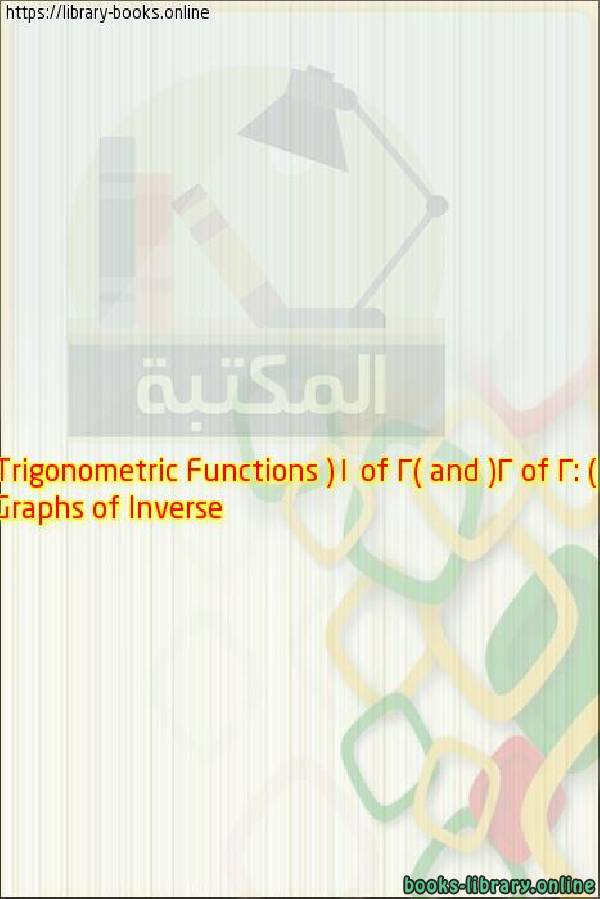📘 قراءة كتاب Graphs of Inverse Trigonometric Functions (1 of 2) and (2 of 2: Considering shifts through domain) أونلاين

the complex number system can be defined as the algebraic extension of the ordinary real numbers by an imaginary number i.[3] This means that complex numbers can be added, subtracted, and multiplied, as polynomials in the variable i, with the rule i2 = −1 imposed. Furthermore, complex numbers can also be divided by nonzero complex numbers. Overall, the complex number system is a field.
the complex number system can be defined as the algebraic extension of the ordinary real numbers by an imaginary number i.[3] This means that complex numbers can be added, subtracted, and multiplied, as polynomials in the variable i, with the rule i2 = −1 imposed. Furthermore, complex numbers can also be divided by nonzero complex numbers. Overall, the complex number system is a field.

solving complex numbers
complex numbers problems
complex numbers calculator
history of complex numbers
complex numbers formulas
complex numbers pdf
complex numbers multiplication
complex numbers khan academy
Complex numbers شرح
بحث عن الأعداد المركبة doc
قوانين الأعداد المركبة
الأعداد المركبة في الحياة
الأعداد المركبة pdf
شرح درس الأعداد المركبة واضح
استخدامات الأعداد المركبة في حياتنا العامة
الأعداد المركبة نحو
( الحلقة 72 و 73 من شرح جزئيات من كتاب Inverse Trigonometric Functions بصورة عملية لتوضيح نقاط محددة بالكتاب )
In this playlist you'll learn all about Complex Numbers - what they are, why they matter, and how to solve a variety of problems that require them. Complex Numbers can be confusing, especially because the most fundamental fact about them seems to contradict one of the most basic things you learn in early mathematics: you can't take the square root of a negative number. In fact, negative numbers have square roots too, and including them in our number system is enormously powerful for unlocking new ways of representing mathematical realities in the world around us.
في قائمة التشغيل هذه ، ستتعلم كل شيء عن الأرقام المعقدة - ما هي وسبب أهميتها وكيفية حل مجموعة متنوعة من المشكلات التي تتطلبها. يمكن أن تكون الأرقام المعقدة مربكة ، خاصة لأن الحقيقة الأساسية عنها تبدو متناقضة مع أحد أهم الأشياء الأساسية التي تتعلمها في الرياضيات المبكرة: لا يمكنك أخذ الجذر التربيعي لرقم سالب. في الواقع ، للأرقام السالبة جذور تربيعية أيضًا ، وإدراجها في نظام الأعداد لدينا قوي للغاية لفتح طرق جديدة لتمثيل الحقائق الرياضية في العالم من حولنا.
A complex number is a number that can be expressed in the form a + bi, where a and b are real numbers, and i is a solution of the equation x2 = −1. Because no real number satisfies this equation, i is called an imaginary number. For the complex number a + bi, a is called the real part, and b is called the imaginary part. Despite the historical nomenclature "imaginary", complex numbers are regarded in the mathematical sciences as just as "real" as the real numbers, and are fundamental in
many aspects of the scientific description of the natural world.[note 1][1]
العدد المركب هو رقم يمكن التعبير عنه بالصيغة a + bi ، حيث a و b أرقام حقيقية ، و i هو حل المعادلة x2 = −1. نظرًا لعدم وجود رقم حقيقي يلبي هذه المعادلة ، يُطلق على i رقمًا وهميًا. بالنسبة للرقم المركب a + bi ، يسمى a الجزء الحقيقي ، ويسمى b الجزء التخيلي. على الرغم من التسميات التاريخية "الخيالية" ، تعتبر الأعداد المركبة في العلوم الرياضية "حقيقية" مثل الأعداد الحقيقية ، وهي أساسية في العديد من جوانب الوصف العلمي للعالم الطبيعي.
Formally, the complex number system can be defined as the algebraic extension of the ordinary real numbers by an imaginary number i.[3] This means that complex numbers can be added, subtracted, and multiplied, as polynomials in the variable i, with the rule i2 = −1 imposed. Furthermore, complex numbers can also be divided by nonzero complex numbers. Overall, the complex number system is a field.
رسمياً ، يمكن تعريف نظام الأعداد المركبة على أنه امتداد جبري للأرقام الحقيقية العادية برقم وهمي ط. [3] هذا يعني أنه يمكن جمع الأعداد المركبة وطرحها وضربها ، مثل كثيرات الحدود في المتغير i ، مع فرض القاعدة i2 = −1. علاوة على ذلك ، يمكن أيضًا تقسيم الأرقام المركبة على أرقام معقدة غير صفرية. بشكل عام ، نظام الأعداد المركبة حقل.
Geometrically, complex numbers extend the concept of the one-dimensional number line to the two-dimensional complex plane by using the horizontal axis for the real part and the vertical axis for the imaginary part. The complex number a + bi can be identified with the point (a, b) in the complex plane. A complex number whose real part is zero is said to be purely imaginary; the points for these numbers lie on the vertical axis of the complex plane. A complex number whose imaginary part is zero can be viewed as a real number; its point lies on the horizontal axis of the complex plane. Complex numbers can also be represented in polar form, which associates each complex number with its distance from the origin (its magnitude) and with a particular angle known as the argument of this complex number.
هندسيًا ، تمد الأرقام المعقدة مفهوم خط الأرقام أحادي البعد إلى المستوى المركب ثنائي الأبعاد باستخدام المحور الأفقي للجزء الحقيقي والمحور الرأسي للجزء التخيلي. يمكن تحديد الرقم المركب a + bi بالنقطة (أ ، ب) في المستوى المركب. يقال أن العدد المركب الذي يكون جزءه الحقيقي صفرًا خياليًا بحتًا ؛ تقع نقاط هذه الأرقام على المحور الرأسي للمستوى المعقد. يمكن اعتبار الرقم المركب الذي يكون جزءه التخيلي صفرًا رقمًا حقيقيًا ؛ تكمن نقطته على المحور الأفقي للمستوى المعقد. يمكن أيضًا تمثيل الأعداد المركبة في شكل قطبي ، والذي يربط كل رقم معقد بمسافة من الأصل (حجمه) وبزاوية معينة تعرف باسم حجة هذا العدد المركب.
The geometric identification of the complex numbers with the complex plane, which is a Euclidean plane ({displaystyle mathbb {R} ^{2}}mathbb {R} ^{2}), makes their structure as a real 2-dimensional vector space evident. Real and imaginary parts of a complex number may be taken as components of a vector with respect to the canonical standard basis. The addition of complex numbers is thus immediately depicted as the usual component-wise addition of vectors. However, the complex numbers allow for a richer algebraic structure, comprising additional operations, that are not necessarily available in a vector space; for example, the multiplication of two complex numbers always yields again a complex number, and should not be mistaken for the usual "products" involving vectors, like the scalar multiplication, the scalar product or other (sesqui)linear forms, available in many vector spaces; and the broadly exploited vector product exists only in an orientation-dependent form in three dimensions.
سنة النشر : 2018م / 1439هـ .
حجم الكتاب عند التحميل : 15 ميجا بايت .
نوع الكتاب : pdf.
عداد القراءة:
اذا اعجبك الكتاب فضلاً اضغط على أعجبني و يمكنك تحميله من هنا:

شكرًا لمساهمتكم
شكراً لمساهمتكم معنا في الإرتقاء بمستوى المكتبة ، يمكنكم االتبليغ عن اخطاء او سوء اختيار للكتب وتصنيفها ومحتواها ، أو كتاب يُمنع نشره ، او محمي بحقوق طبع ونشر ، فضلاً قم بالتبليغ عن الكتاب المُخالف:
 قبل تحميل الكتاب ..
قبل تحميل الكتاب ..
يجب ان يتوفر لديكم برنامج تشغيل وقراءة ملفات pdf
يمكن تحميلة من هنا 'http://get.adobe.com/reader/'


 منصّة المكتبة
منصّة المكتبة